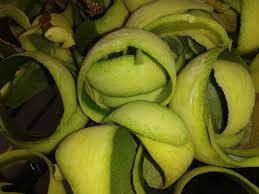
Wheat straw and mango peels are normally disposed of in landfills or used as animal feed, but can provide feedstock polymers and antioxidants to produce renewable, biodegradable and nontoxic active food packaging.
Active food packaging has the ability to respond to temperature and time changes in food storage and could help keep products fresher for longer. This is one of the main findings of her recent doctoral study.
As part of her study, Mugwagwa developed and optimised processes for extracting polymers and antioxidants. She then combined the polymers and antioxidants to make a food packaging material and tested the stability of the biocomposite films when in contact with food, as well as their potential to release antioxidants into packaged food over time.
Low-density polyethylene film, a commonly used plastic, was used as a benchmark.
The properties of polymers and antioxidants in wheat straw and mango peels can be tailor-made during extraction to suit their application in food packaging, says Mugwagwa, adding that the polymers and antioxidants can be extracted simultaneously from the same feedstock without affecting their use in food packaging.
“The bio-based films that I developed were capable of releasing more antioxidants into food over a short period of time when compared to low-density polyethylene plastic. This suggests they can be a replacement for perishables food packaging.
“The release of antioxidants into food by packaging material is becoming an important aspect to consider when choosing packaging material. Packaging material capable of releasing antioxidants into food in response to storage conditions have the potential to increase the shelf life of products because the released antioxidants act upon free radicals and microorganisms, which may develop when food is improperly stored or stored for longer periods.”
The polymers are cheap, sustainable and biodegradable and can be used in the development of food packaging, as well as presenting methods for recovering natural antioxidants and their application as additives to food packaging material. These natural antioxidants have the potential to replace artificial antioxidants in packaging material. Biorefineries and the food packaging industry, as well as farmers and consumers, will benefit from the research, she says.
Mugwagwa’s study was conducted under the supervision of Stellenbosch University Department of Process Engineering professor Annie Chimphango, with the financial support from the Organisation for Women in Science for the Developing World, the Swedish International Development Cooperation Agency (SIDA), the National Research Foundation of South Africa, the Department of Science and Innovation and the Council for Scientific and Industrial Research Waste Road Map, and Stellenbosch University Department of Process Engineering.






